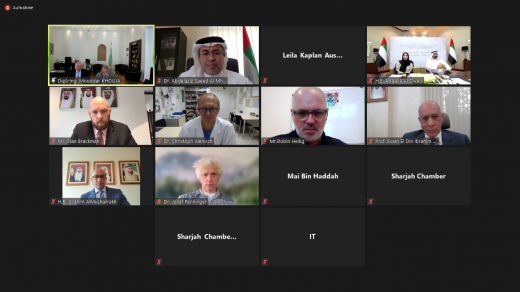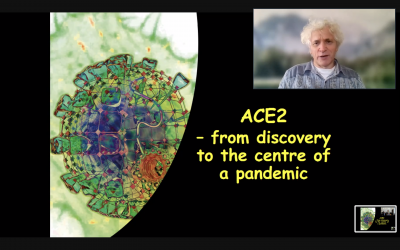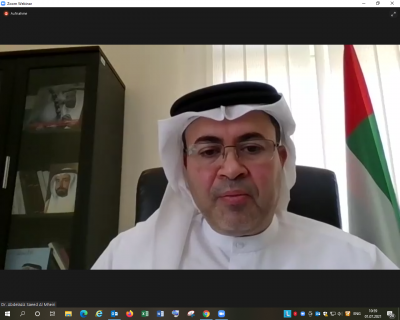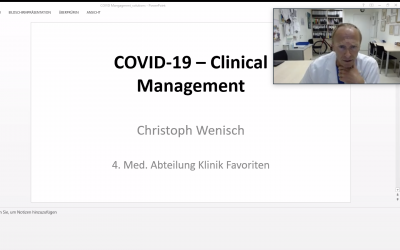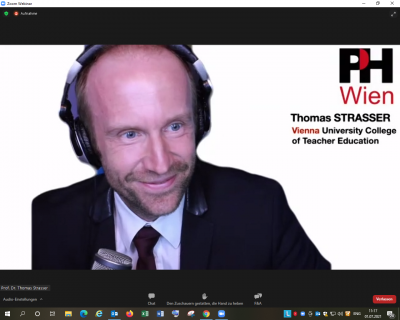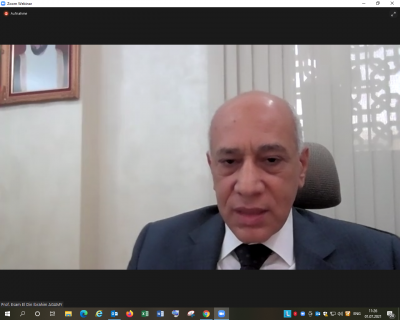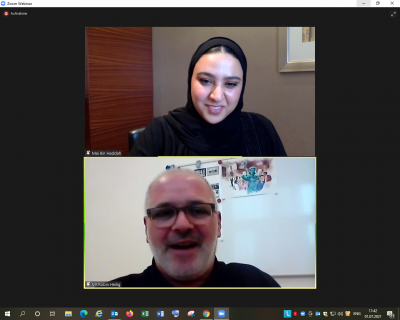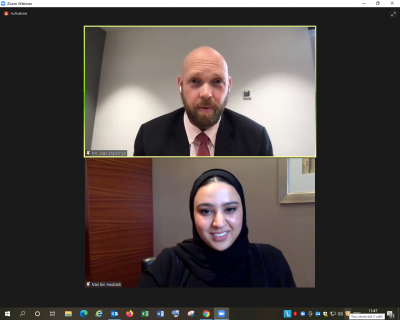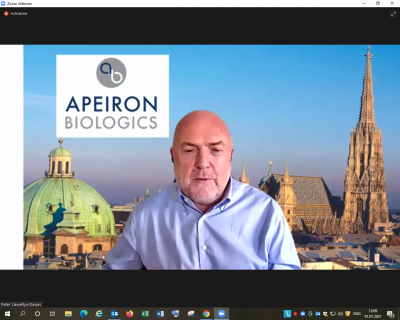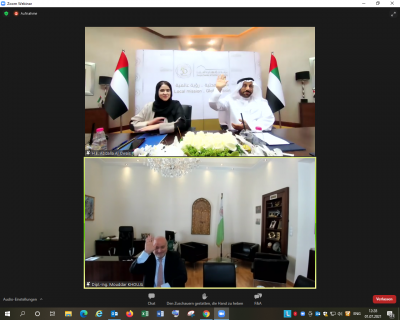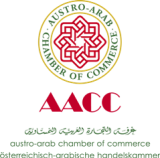On July 1st 2021, the webinar “Adjusting to ‘New Normal’ in Education and Healthcare sectors in the UAE & Austria” took place, jointly organised by the Austro-Arab Chamber of Commerce (AACC) and Sharjah Chamber of Commerce & Industry (SCCI). The webinar was attended by over 100 participants, who joined virtually from all over the world.
Welcome notes and opening remarks were delivered by AACC Austrian President H.E. Senator Dr. Richard Schenz, Chairman of Sharjah Chamber of Commerce & Industry H.E. Mr. Abdullah Sultan Al-Oweis and the Ambassador of the United Arab Emirates to Austria H.E. Mr. Ibrahim Al-Musharrakh. Ms. Fatema Khalifa Al-Muqarrab, Director of International Relations Department at Sharjah Chamber of Commerce & Industry, also delivered a presentation on behalf of SCCI.
Throughout the webinar, two thematic sessions were held, the first one revolving around healthcare and moderated by AACC Secretary-General Mr. Mouddar Khouja, and the second around education & new technologies and moderated by Ms. Mai bin Haddah, International Partnerships Executive at SCCI. The two sessions were followed by a company presentation by Mr. Peter Llewellyn-Davies, CEO of Apeiron Biologics.
Prof. Dr. Josef Penninger, a world-leading geneticist and virologist commenced the presentations, whereby he provided insights into the latest research and medication trials on SARS-CoV-2. He explained how the Angiotensin Converting Enzyme 2 (ACE2) was the essential entry gate for SARS-CoV-1 in 2003 and again for SARS-CoV-2 in 2020. He and his team have been conducting extensive research and together with his company developing a soluble form of ACE2 for the treatment of covid-19, capable of blocking the virus from finding the real entry gate while simultaneously protecting multiple organ tissues from damage. Prof. Penninger stated that ACE2 generally works against any variant which could come along our way, unlike vaccines and antibodies.
Dr. Abdelaziz Saeed Al Mheiri, Director of the Sharjah Health Authority, spoke about reshaping the global healthcare landscape in light of the COVID-19 pandemic that led to a global health and economic crisis. He elaborated on various measures taken by the UAE to contain the virus spread, such as initiating the vaccine drive across the country as early as October 2020 and vaccinating around 73% of the total population. He presented some of Sharjah Health Authority’s major initiatives, including a continuous awareness-raising program about COVID-19 protocols. Dr. Al Mheiri highlighted the fact that Sharjah Healthcare City is a free zone city developed recently with the goal of transforming and enhancing the regional healthcare service industry and offering investment opportunities.
Prim. Univ. Doz. Dr. Christoph Wenisch, Head of the Department of Internal Medicine, Infectious Diseases and Tropical Medicine at Klink Favoriten, gave an overview of the situation in hospitals and provided insights to clinical experience. Special units comprised of an ICU, intermediate care and normal ward in a hospital setting are needed, whereby support can be offered by other departments. He stated that 60/200 people (30%) in the department he has been leading were infected by COVID-19 virus and had to be substituted by very highly educated personnel. As the virus emerged, low cases were recorded and there was a very little knowledge of the virus yet many qualified personnel and functional hospital beds; this knowledge increased with practice yet the personnel is exhausted. This could be addressed and evaded by means of engaging in clinical studies and establishing intelligence hubs to share knowledge and best practices in treating SARS-CoV-2 and other viruses and diseases.
Dr. Thomas Strasser, Professor of Technology-Enhanced Learning & Teaching at Vienna University College of Teacher Education, shared his approach to the best technology-enhanced learning and highlighted key challenges of distance learning, such as information overload and the nonreachablility of teachers in the virtual and digital context. Dr. Strasser highlighted that importance of focusing on a blended learning approach or instructional design, methodological versatility and the sociality aspect, rather than on a sole technological determinism. He stressed that professors do not have to be IT experts but rather to be good teachers with solid profound pedagogical knowledge; technology should act as a catalyst for innovative learning and teaching scenarios.
Prof. Esam Agamy, Dean of Quality Assurance, Institutional Effectiveness and Accreditation at the University of Sharjah elaborated on the importance of education in terms of content, teaching and learning methods, as well as using technology and other means to facilitate the delivery of the content. He elaborated on the introduction of a new concept called e-portfolio, which enabled students to see patients from a distance (using technology) and share their experiences and acquired knowledge. Prof. Agamy stressed the importance of continuing with the hybrid mode and virtual collaboration among all parts of the world post-pandemic too. In his view, this gives students a more global vision and understanding and thus renders them global citizens.
Mr. Robin Heilig from the CIO Office of the City of Vienna on Strategic Digitization of Public Administration, focused on digitization from a perspective of public administration. He elaborated on the “intensive crash course”, whereby a web application was created at the beginning of the COVID-19 pandemic for asymptomatic infected persons, enabling them to hand in updates on their health situation from home and thus saving hospital beds for severer cases. This app was created within 2 weeks only instead of the 9-months-standard period. Mr. Heilig emphasised the importance of developing methodological skills and vigorously collaborating with other communities and academic and research institutions. He clarified that digitization doesn’t equal technology, but it is either an enabler or a disabler; our social needs and digital tools are just the means of either enabling benefits or not.
Mr. Stan Brackman, Director of Strategic Planning and Excellence at Sharjah Private Education Authority, elaborated on the learning process and ways to improve the education system. In response to the COVID-19 pandemic, the Authority implemented a three-phase process comprised of launching distance learning, followed by building within schools the ability to deliver very effective and engaging distance learning sessions, and finally applying the hybrid model, all while prioritizing capacity-building. Mr. Brackman also pointed out that communication between schools and students’ parents improved qualitatively and quantitatively since the outbreak of the COVID-19 and applying the above-mentioned model.
Towards the end of the webinar, Mr. Peter Llewellyn-Davies CEO of Apeiron Biologics, delivered a presentation of the company, complementing Prof. Dr. Penninger’s presentation on ACE. Apeiron Biologics, a successful Biotech company focusing on respiratory diseases and cancer therapy, has already completed multiple trials on an effective drug for the treatment of SARS-CoV-2 and is currently developing a cancer therapy in development. In his presentation, Mr. Llewellyn-Davies provided a detailed explanation of the drug candidate for SARS-Cov-2, which protects from all virus mutations and variants.
Categories: Reports

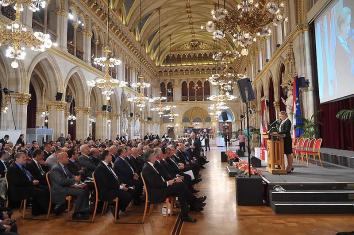






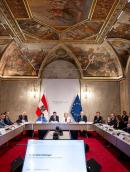








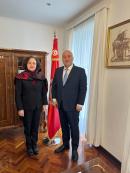









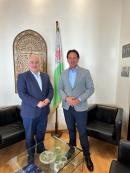

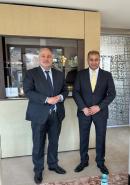
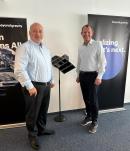
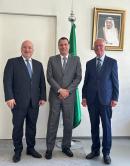
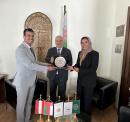


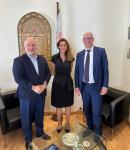
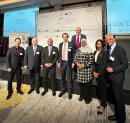
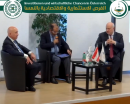




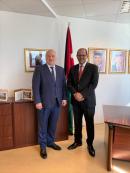
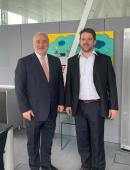
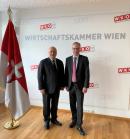

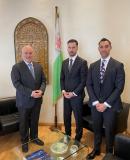

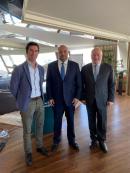
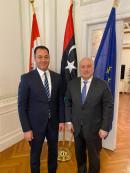





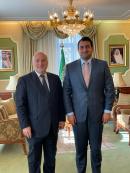
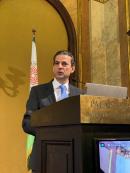
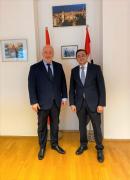
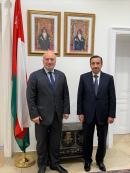



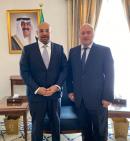
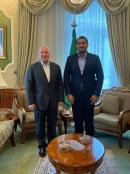
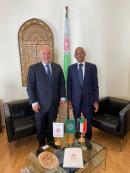
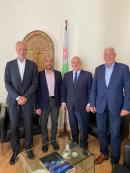
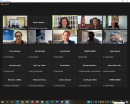


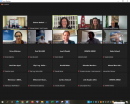




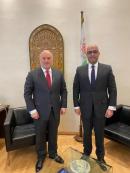

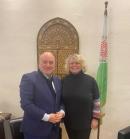


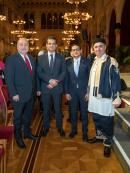

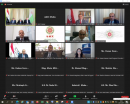



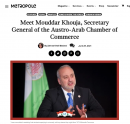



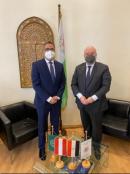


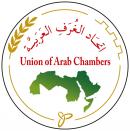


 Go to blog
Go to blog 